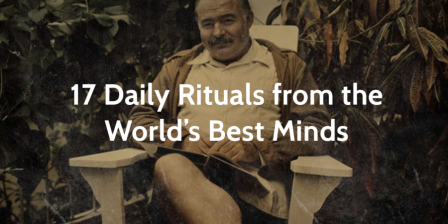
You might think I’m about to tell you to get up as the sun rises, sit down at your desk and work until you can’t work any more. That’s probably because you’ve heard advice like this pretty often…
In fact, Slate writer Mason Currey says that after reviewing 161 daily rituals, the key lesson you can extract is:
“Get up early and go straight to work, making a cup of coffee if you like but not doing much else before sitting down.”
This is something I strive to achieve, usually having a run and a coffee before getting down to it. I find that if I let myself get caught up in tasks that have no clear end before I start working, it kills my whole day.
When I’m working, I’m happily open to distractions — anything from having the TV on in the background to making a run to the shop — but I always get up early to smash those vital tasks out of the way first and then take a more relaxed approach to the afternoon.
This doesn’t work for everyone. In fact, Currey says it’s only around one-third of people that can do it. Maybe you can take inspiration from some of the world’s best minds and adjust your daily ritual for success.
Ernest Hemingway: Set an exact quota for your work and NEVER stray from it

Like a lot of writers, Hemingway used the early hours of the morning to write away from the busyness of daily life. He wrote pen to paper at sunrise, only stopping when he hit his word count. In the afternoon, he’d move onto the more mechanical task of typing up the pages on his typewriter.
When he’d typed out his daily quota, he’d have ‘a few’ drinks, pass out, and wake up at sunrise the next day to do it all over again.
No matter how much of a maverick figure Hemingway is, you’ve got to respect his willingness to be ruled by word count over all.
Action: Whether you’re a writer, salesperson, or accountant, set yourself a fixed amount of work every day and don’t let yourself stray from it.
Barack Obama: Value your time alone at midnight

After dinner with his wife at 6:30pm, Obama retires to his private office for the majority of the night, barely getting 5 hours of sleep. Instead, he spends his time reading letters, taunting his friends about sports, and on his iPad.
After a busy day likely filled with much debating, public appearances and hard mental work, Obama finds peace in solitude, not sleep. Fun fact: Obama eats exactly seven almonds for his evening snack.
Action: If you’re a night owl forced to work in the day, relax in the early hours of the morning to give your brain time to cool off for tomorrow.
Wolfgang Amadeus Mozart: Adjust your work to your life, but always get it done

In his own time, Mozart simply wasn’t worth as much as he is now. He had to balance his energy between finding clients, teaching piano lessons, courting women and endearing himself with nobility. Whatever he had to do to find happiness and his next commission, he made it a priority, only taking time to work on his compositions when the hustle was done.
Mozart composed from 11pm to 1am every night, sleeping for 5 hours and rising at 6am to take on the next day.
Action: Your work is a priority, but your passion is equally important. Get work out of the way first to give yourself time for your passion — whatever the cost.
Sheryl Sandberg: Leave work at the same time every day

Sandberg felt guilty for leaving the Facebook office when it was still light out, but made a promise to herself she’d always be home by 6pm to have dinner with her children.
Daily rituals are as much about knowing when to stop as they are knowing when to start. When she does decide to go to bed, she makes sure she turns off all of her electronics for a sound and uninterrupted sleep.
Benjamin Franklin: Take time to reflect twice every day

Franklin’s daily routine is one of the most famous examples out there because it’s so well documented. The most interesting part about his ritual is the time to exercise emotional intelligence and deeply reflect about the day and how he feels about it.
At 5am, he woke up and asked himself “what good shall I do this day?”. Between 6pm and 9pm, after working in two four hours blocks, he allowed himself time to examine the day’s events and asked himself “what good have I done this day?” at 10pm, right before bed.
Another lesson we can learn from Franklin’s daily ritual is that nothing is ever set in stone. He was well known to experiment with his schedule, play around and optimize it to try and allow as much room for creativity as possible.
Action: In the morning, make a plan of the three things you’re going to get done today. Before bed, reflect on whether you’ve done them.
Warren Buffett: Spend 80% of your day reading

As a billion dollar investor and the CEO of Berkshire Hathaway, it’s safe to say Warren Buffett is a pretty smart guy. He spends 80% of his day reading — around 500 pages per day — because he says while reading your knowledge building up “like compound interest”. An apt simile.
Even though he is one of the world’s most successful people, he doesn’t spend his time reclining by an ivory pool on a throne made of diamonds. He lives in the same house small he bought 40 years ago, drives a $ 30,000 car and takes business associates to McDonalds.
He doesn’t value an overstated lifestyle, and that’s obvious in his daily routine, which shows he devotes his life to knowledge and humility.
Action: Devote as much time as you can spare to reading. Instead of taking a break to browse reddit, crack on with a book. Not sure what to read? This list is a great place to start.
Thomas Mann: Work for three hours solid, whether you want to or not

When are your most productive hours? Thomas Mann had realized that he worked best between the hours of 9am to noon, so would never let himself do anything but focus work during those hours.
Knowing the hours you work best is a gift, so Mann would advise you always to take advantage of that. The way I found my best hours for writing was simply to check the average time I create a new document in my writing app. I found that I often got around to solid writing between 10am and 1pm, so I leave these three hours aside for furiously drafting, and do my creative work later.
Action: Log your tasks and timings for 1 month solidly. Use a spreadsheet, and then find the average start time for your most productive tasks. When do you work best?
Steve Jobs: Live today like you’ll die tomorrow

Steve Jobs spent the morning in meetings with his executive team, the afternoon in a spacious design studio with the future range of products spread out on industrial tables, and the evening with his family.
He did this every day because he wanted to live every day like it’s his last. For you, the ideal day might not start with meetings followed by deliberation over product design, but for Jobs, he’d have it no other way.
Action: Tone this down a bit by just cutting the unnecessary tasks from your day. Do you need that extra meeting, or that extra hour for email processing? Ruthlessly eliminate work that doesn’t make you happy or isn’t 100% necessary.
Pablo Picasso: Never let anything distract you from your work

Picasso was an intense and anti-social man, who worked into the night after starting at 2pm. Once he got started, he’d completely ignore any obligations, locking himself in his studio and refusing to come out or speak to anyone all day.
For some people, being disconnected from people might help your focus or creativity, but often time with business work it’s necessary to communicate with others. To get this same kind of effect, you can close your email client from noon ’til 6pm, turn Slack onto Do Not Disturb, or ask people around you to give you some time to work alone.
Action: Is something distracting you consistently? Can you get into another room, or maybe use a tool like RescueTime to block social media? Try setting a Do Not Disturb schedule on your phone and on Slack to make sure you can focus when it matters.
Kenneth Chenault: Write down the top three things you’ll do tomorrow

If you focus on the future, it’ll be easy to handle when it inevitably arrives. At the end of each day, American Express CEO Kenneth Chenault writes down three things he wants to accomplish tomorrow.
This is a well-known approach thanks to Mark Twain’s famous live frog quote that advises you to start the day by getting the most important tasks out of the way.
Action: Don’t finish work for the day until you’ve written down the top three tasks for tomorrow. The next day, you’ll know exactly what to do and when. (That means you’ll catch yourself browsing Twitter and quit off straight away.)
Herman Melville: Do something monotonous every morning

The same way that Einstein came up with the foundational research for the general theory of relativity while working as a patent clerk, Melville found the mental energy to write by exhausting his physical energy on farm work.
Just like how I often come up with article ideas while zoning out in the shower or the vacuuming the living room, when you’re clearing your mind you give it room to breath and bring those big ideas bubbling to the surface from your subconscious.
Action: Schedule more time to do repetitive work. For me, this is things like updating spreadsheets or housework. Both are non-creative and free up valuable mental energy.
Jack Dorsey: Focus on one very specific thing each day of the week (and work two jobs?)

Jack Dorsey, superhuman. Owning both Twitter and Square seems like enough work, but what about working 8 hour days at both companies? Dorsey puts in 16-20 hours of work every day at his two businesses, but finds a very manageable way to do it without going totally mad. Instead of working on everything under the sun every day, he breaks it into themes, like this:
- Monday: Management meetings and “running the company” work
- Tuesday: Product development
- Wednesday: Marketing, communications and growth
- Thursday: Developers and partnerships
- Friday: The companies and their culture
Action: Batching tasks is a proven way to get more done, and even be able to run two companies simultaneously hands-on. Look at your calendar and your todo list. Is there any way you can work on similar tasks back to back so you don’t have to switch your mindset around too much?
Mark Twain: Physically lock yourself away

Not satisfied with the creative potential of his everyday life, Mark Twain would move to a farm in New York state every summer and lock himself into a room after breakfast and not emerge until dinner time at 5pm after writing solidly without a single distraction.
If you’re wondering how well this routine works, just check the sheer amount of output in Twain’s bibliography, namely 11 novels with 2-5 years between each and 26 short stories — sometimes several per year.
Action: Make it impossible for yourself to get distracted at work during times of vital focus or creative output. Just make sure to socialize after work or you could start feeling like some mad hermit.
Sergey Brin: Check your tasks at 2pm

Ah, mid-afternoon. It’s a decisive factor determining whether or not you’re going to get a little or a lot done. It’s the post-lunch digestion slump where you probably feel more like napping than cracking on with that spreadsheet.
To keep yourself going, you need to check in with yourself at 2pm and lay out the rest of the day. Otherwise, you risk drifting aimlessly through the hellish highway of reddit, Twitter, Facebook, and, finally, clocking off early.
Action: Review your tasks both in the morning and at 2pm to stop yourself working aimlessly on things that don’t matter. The afternoon’s a good time to set yourself up and start the next day off well. (Oh, and check out his old website for a laugh.)
Alexander Graham Bell: Always break routine for a big idea

Bell was a bad tempered man and as much a rigid creature of habit as anyone on this list. His assistant of 30 years, Charles, reports on his experiences:
“His daily routine was adhered to in the most minute details […] any changes by accident or intent would upset [Mr. Bell] for the entire day. To call him before nine o’clock in the morning usually gave him a bad headache.”
Even with this harsh routine in place, Bell knew the importance of giving over when a big idea strikes. He’d sometimes work for 22 hours non-stop (not a part of his schedule, of course), and sleep just three hours per night in his moments of fevered inspiration. When the feeling came over him, he said his body tingled and wouldn’t stop for anyone.
Action: Don’t restrain yourself if you feel like you’re on the verge of a breakthrough while trawling through spreadsheets. Drop anything for inspiration.
Bill Gates: Watch educational videos on the treadmill

Microsoft CEO Bill Gates exercises his body and mind as soon as he wakes up, watching lecture series from The Teaching Company while running for an hour on the treadmill.
If, like me, you can sometimes get distracted while only watching something, this would be an ideal way to calm down that part of the brain that’s telling you ‘shouldn’t you be doing something as well as this?‘.
Action: Supercharge your morning exercise ritual by having educational content on while you do it. It could be an audiobook while you go for a run, or a lecture while biking.
Stephen King: Be happy to finish work at 11:30am

Every single day of the year, King sits down to write at 8am. His brain knows what when it hits 8am, it’s time to become creative — he’s trained himself to do it on demand, which is something not many creatives can say.
The best part about this? He usually finishes between 11:30am and 1:30pm, then spends most of the day doing whatever he wants without the worry that he’s not doing the most productive thing possible.
For someone like me, this would scare me to death. I finish work when my brain’s burnt out and my eyes need a rest, after I’ve done everything I set out to do, and not before.
Action: When you’re sure you’ve done your work for the day, just stop and be safe in the knowledge that enough is enough. (I think this is a lesson I need to learn as much as anyone.)
What’s your daily ritual?
I wake up early, run, have a coffee and go to work. I’ll sometimes forget to take a lunch break, but stop in time to enjoy my evening, never running over in the middle of the night.
What about you? Let’s chat in the comments. 
(139)
Report Post






